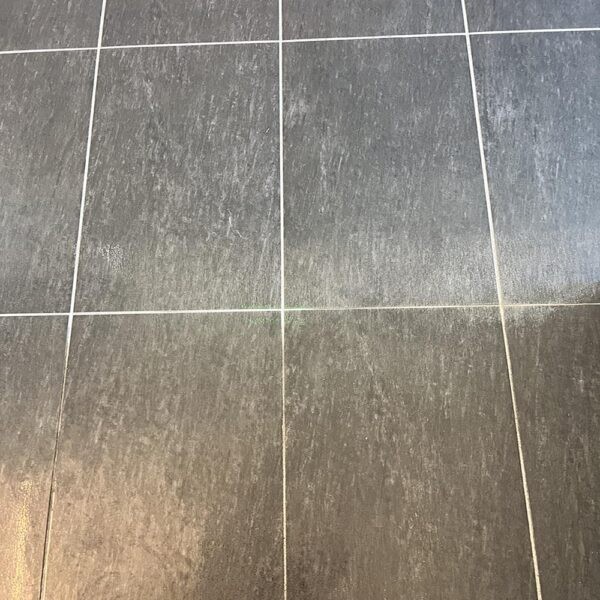🐾 Pet Odor Removal from Floors in Manhattan Beach, CA
Living in scenic Manhattan Beach, CA comes with sunshine, coastal air—and sometimes, lingering pet odors trapped in floors. Whether it’s tile, luxury vinyl (LVT), or natural stone, pet accidents can leave behind bacteria, ammonia, and odors that basic cleaning can't fix.
🧼 From soiled grout lines to porous stone and high-traffic LVT zones, each surface requires a specialized approach. Our Manhattan Beach floor cleaning professionals use eco-friendly, enzyme-based treatments that are safe for pets—and powerful enough to eliminate odors at the source.
- ✅ Safe and effective on tile and grout
- ✅ Restores freshness to LVT floors and baseboards
- ✅ Neutralizes odors from pet urine, dander, and bacteria
- ✅ Great for natural stone surfaces like travertine and marble
🧱 II. Types of Floors & Their Pet Odor Challenges
Different flooring types in Manhattan Beach homes react differently to pet stains and odors. Here’s a breakdown of what to expect—and how to handle it.
🧼 Hard Tile
Odor Risk: Medium
Challenge: Grout lines absorb urine and bacteria.
Cleaning Method: Enzyme prespray + grout extraction
Frequency: Every 3–6 months
🧴 LVT (Luxury Vinyl Tile)
Odor Risk: Low – Medium
Challenge: Traps surface-level pet odors in seams and joints.
Cleaning Method: Safe neutralizers + surface deodorizing
Frequency: Monthly or as needed
🪨 Natural Stone
Odor Risk: High
Challenge: Porous and sensitive to chemicals; retains deep-set odor.
Cleaning Method: pH-neutral cleaner + resealing
Frequency: Every 6–12 months
🌳 Hardwood
Odor Risk: High
Challenge: Deep absorption and warping risk with over-wetting.
Cleaning Method: Dry extraction or controlled moisture + odor neutralizer
Frequency: As needed + refinishing when necessary
🐶 III. Types of Pet Odors & Their Causes
Pet odors aren't all the same. Each one leaves a unique imprint on your floors—especially in homes near the ocean, like Manhattan Beach, where moisture can amplify lingering smells. Here's a breakdown of the most common types:
| 🚨 Pet Odor Type | 🔍 Cause |
|---|---|
| Urine | High in ammonia; causes bacterial growth deep in grout and porous flooring. |
| Feces | Surface-level bacteria and staining—especially on tile and LVT seams. |
| Dander & Oils | Daily shedding builds up in grout lines and textured flooring, causing long-term smell. |
| Wet Dog Smell | Trapped in porous floors like natural stone and grout after moisture exposure. |
🧼 IV. How to Remove Pet Odors Based on Floor Type
Each flooring material requires a specific method to safely and effectively remove pet odors. Follow these professional steps for long-lasting results on your Manhattan Beach floors:
-
Hard Tile / Grout
✅ Apply enzyme-based pre-treatment to grout lines
✅ Agitate with a grout brush or CRB machine
✅ Extract using hot water or a wet vac
-
LVT (Luxury Vinyl Tile)
✅ Clean with mild, pet-safe neutralizer
✅ Avoid steam or high heat on click-lock installations
-
Natural Stone
✅ Use only pH-neutral stone-safe cleaners
✅ Reseal after cleaning to prevent odor absorption
-
Grout (Standalone)
✅ Spot-treat pet-affected grout with enzyme gel
✅ Use a stiff-bristle grout brush for agitation
✅ Rinse and extract, then air dry thoroughly
🐕 V. Maintenance Tips for Manhattan Beach Pet Owners
To prevent pet odors from returning, especially in the humid coastal air of Manhattan Beach, follow these proven maintenance strategies for tile, grout, LVT, and stone floors:
🧹 Regular Dry Mopping
Use a dry mop or microfiber duster daily to collect pet hair, dander, and beach sand before it embeds in grout or seams.
🦴 Pet Area Mats
Protect floors by placing absorbent mats under litter boxes, food bowls, and beds to trap moisture and debris.
🧴 Reseal Stone & Grout
Reseal natural stone and grout every 6–12 months to reduce odor absorption and staining from pet accidents.
🌿 Routine Deodorizing
Even without visible messes, use an enzyme-based spray weekly to neutralize odors and refresh your space.
❓ VI. Frequently Asked Questions (FAQs)
🚀 Ready to Eliminate Pet Odors for Good?
Restore freshness to your home with our trusted pet odor removal services in Manhattan Beach—safe for pets, powerful against odors, and tailored to your floor type.

